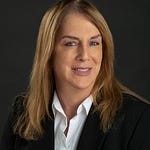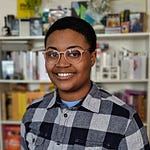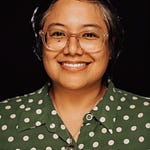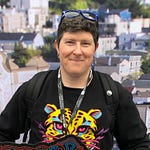Sera shares the impact of when a former employer supported her as a transgender woman and how that led her to become involved in the community work that deeply shaped her leadership values. We talk about a recent study her current employer commissioned on transgender, nonbinary, and gender expansive employment, and how her office is using the results to build programs, offer training, and become more even proactive to ensure that anti-trans and anti-LGBTQ bias and harassment no longer occur.
TNG Worklife is a podcast and ongoing conversation about the work-life experiences of the transgender, nonbinary, and gender expansive communities.
You can find us on Apple, Spotify, Google and Instagram.
This podcast is always free, and if you enjoyed it, you can support the work by subscribing for as little as $8 a month.
About Sera Fernando
Facebook: https://www.facebook.com/peacelovesera/
Office of LGBTQ Affairs website: https://lgbtq.sccgov.org/home
The Survey: Santa Clara County Transgender, Nonbinary, and Gender Expansive Employment
Credits
Opening music - Abstract Fashion Pop by QubeSounds
Closing music - Where the Light Is by lemonmusicstudio
Episode Transcript
[upbeat pop music plays]
Kai Stowers
Hi, I'm Kai Stowers, host of TNG Worklife, a podcast about the work life experiences of people in the trans, non binary, and gender expansive communities. I hope you join our community by signing up at tngworklife. substack. com, which will deliver each episode, including the full transcript, right to your inbox.
This week, I meet with Sera Fernando, manager and leader for the county of Santa Clara Office of LGBTQ affairs and the Chief Diversity Officer for Silicon Valley Pride. We talk about how her background in retail led her into her current career, which, as she likes to say, is as a queer professional. We discuss surprising findings from a recent survey her office commissioned and how she is driving change to improve outcomes both internally and in the broader community.
Let's get into it.
Hi Sera. It's so good to have you on the podcast. I've really been looking forward to this conversation.
Sera Fernando
Yeah, me as well. Thank you so much for having me.
Kai Stowers
Absolutely. Can you kick us off by saying a few words about who you are to our audience?
Sera Fernando
Just to let you know a little bit about myself, my name is Sera. I use she her pronouns, and I self-identify as a proud queer, transgender Filipino woman.
My coming out date is 10 years coming this fall. And what's cool is that I've never really imagined to be where I'm at career wise, where I stand with my gender identity and I, I know that's due to a lot in part of my own personal privilege.
Kai Stowers
Yeah. We'll be talking about the incredible work you've been doing in your current role at The Office of LGBTQ Affairs in Santa Clara County.
But first I wanna take a moment to recognize that you have a wide range of experience in sales, management and retail.
Sera Fernando
I love that you bring in retail because before I worked at the county, I worked in retail for close to 20 years. I was in retail since teenage years. I'm aging myself just a little bit
[laughter]
but my career in retail's taught me is to think about what good customer service looks like.
It was really Microsoft, my prior retailer that gave me the ability to transition at my own pace back when Microsoft Stores was still a thing. I was able to look at Microsoft's benefits, package some of their policy and think, well, if I'm going to transition,
At least I know that I'm protected in my job and
Kai Stowers
And that's huge.
Sera Fernando
Absolutely. It was as simple as just seeing on the wall that gender identity was protected. I took that as, if I do come out as trans, I won't get fired, but
Kai Stowers
Right.
Sera Fernando
Little did I know how supportive that workplace would be. That first step eventually allowed me to really contribute to Microsoft's diversity and inclusion goals.
Kai Stowers
And you were part of the employee resource group there, correct?
Sera Fernando
Yeah, that's correct.
I was just like LGBTQ group, Microsoft. I think that was just what I Google searched.
Right. And they had their LGBTQ employee resource group. just gave me the ability to find community and share a little bit about my story. What got me deeply invested in their executive leadership at Microsoft's LGBTQ employee resource group was to recognize my own privilege and just be so thankful that I was able to transition the way I envisioned myself to transition, to be given those benefits. What better way to just show my gratitude than to give back? So yeah, give back is what I did.
I think that the easiest thing I was able to do was just to be able to share my story.
That eventually led to the ability to help advise on policies and especially benefits, to see what they could do to improve systems. Even though my journey it was so long ago, but when I actually reflect back on it, it was difficult. we're talking about like financial burden, right?
We're talking about finding inclusive therapists.
Kai Stowers
Oh, that's still so tough.
Sera Fernando
Yeah.
Just finding inclusive care was difficult. So what I was able to advise as to what my journey looked like and what Microsoft could actually do better in terms of inclusive benefits. And that's inclusive of like cosmetic surgery.
Kai Stowers
Mm-hmm.
Sera Fernando
Might be considered cosmetic to some, but for folks of transgender experience, it's absolutely necessary.
Kai Stowers
It's so exciting to hear when there's a company that like, oh, we wanna do better and we wanna learn how, and that partnership can be so productive.
Sera Fernando
Yeah. What I love about Microsoft is that not only did they give me that ability to empower the organization to know what gender affirming looks like. I was paid for my time in terms of regular work hours to take some of my workday and be more invested in employee resource groups, but also be given the tools and the resources such as training, development, and workshops.
I'm having like a deja vu, but I do a lot of talks. It was through Microsoft's guidance to hone in my voice. A book called Talk like Ted was recommended
Kai Stowers
Oh, okay
Sera Fernando
by my mentor at the time.
Being provided with the tools really helped to shape my career
Kai Stowers
So you were at Microsoft, it sounds like you were having a pretty good experience there. You're getting support, you're getting development opportunities. What led you to this next part of your career?
Sera Fernando
It was through my community work. What was fairly exciting was the ability to also give back to my community.
Microsoft has this really, really cool matching program, right? Where the amount of time that you give back to a community, Microsoft matches a dollar amount per hour. Back then I wasn't able to give financially. But in terms of community service, that's where I was just like, let's see how much Microsoft could give back.
[laughter]
I think, the maximum amount that Microsoft could give back was in the five digit amount right so we're talking about tens of thousands of dollars.
Kai Stowers
Okay.
Sera Fernando
I eventually met some people from Silicon Valley Pride, and that's where I built this strong community platform. My first experience at a Silicon Valley Pride event, I just didn't really see the trans community reflected. Maybe because it was like the hottest day of summer,
[laughter]
but I, I just met some of the team members there and expressed my concerns and complaints and that feedback led to an ongoing stage. It's called the Liberation Stage now, but back then it was called the Trans and Friend Stage, which allowed trans performers to perform at Silicon Valley Pride. We were able to bring more trans and non-binary and gender expansive voices to Silicon Valley Pride and through my work for the past five to six years at Silicon Valley Pride, we really impacted being able to bring a strong gender diverse contingent at Pride.
And I just felt that in terms of my community work at Microsoft and my community work
Kai Stowers
yeah
Sera Fernando
with Silicon Valley Pride, it just made sense for me to look at different ways where I could impact the trans community. That led me to the office of LGBTQ Affairs, because with Microsoft, I just felt that there's only so much I could do within the company.
Not gonna say that Microsoft's rainbow washing cuz they're not but I just felt that my impact with my local community would really impact the lives of trans non-binary and gender expansive folks. This led me to Office of LGBTQ Affairs.
Kai Stowers
Yeah. Yeah. So you could really center your work full-time in the area you're most passionate about, yeah.
[laughter]
Sera Fernando
Yeah. My old coworkers says that we are queer professionals, so yeah, that is fine with me.
[laughter]
Kai Stowers
And so your office recently commissioned a really thorough study on employment in Santa Clara County for transgender, non-binary and gender expansive people. My former career was as a scientist, so I love data, and I'd really like to spend a good chunk of our conversation today diving into some of the findings.
Sera Fernando
Some of the disparities that we've seen, especially the stigma, the bias and discrimination that happens against trans and non-binary folks, It's something that is almost in line with the national average, which is surprising because you think that considering that we're part of the San Francisco Bay area, we'd be more inclusive. but when we go out and actually ask folks of trans experience, you could see that there's still a lot of work that needs to get done.
The good is that we know where we're at in terms of everything when it comes to trans inclusion in the workplace.
Even though the results aren't the best in the world, we have a strong foundation for the next four to five years to build new programs. that is what we're excited about.
Kai Stowers
Yeah.
And what are some of the challenges that you plan to address in the next four to five years?
Sera Fernando
Yeah, that's a great question. One thing that a lot of people are asking for is trans, non-binary, and gender expansive cultural competency to be able to understand trans stories, the trans experience, and for them to be informed on what they could do to be more accepting and affirming
Kai Stowers
I hear that cuz I work with companies too, and a lot of times there's really good intentions. And then you talk to the trans, non-binary, gender expansive people, and those good intentions are not getting translated to inclusion, right?
[laughter]
Sera Fernando
Yeah, yeah.
Our office does trainings. I individually do trainings. I offer up many different solutions. But the work involves changing the hearts and minds of others. That takes a little bit more than checking off a box and saying, you attended a training.
A one hour, even like a three hour required training is not enough to break down the years of implicit bias or unconscious bias. Right? That's why we take a multi-pronged approach, things from summits to storytelling events to Pride celebrations to panel events, and all sorts of trainings.
It's the ability for people to go from, I want to just get this out of my way to I really want to help support the trans community and be a strong and active ally.
Kai Stowers
If you think back to some of the trainings you've done, can you think of a time where a participant really had an aha moment,
like they didn't get something before and as a result of the training, they're like, Oh, I really didn't get this. I want to do better now.
[laughter]
Sera Fernando
Yeah, oh yeah, the aha moments come very frequently and it's cool to see. The one aha moment that people get is that it's okay to make mistakes because we all do it.
Kai Stowers
Yeah.
Sera Fernando
And I think that giving yourself a little bit of grace and just finding that, you know what? I want to do better, but in terms of my learning process, there's going to be bumps along the way. You might get the wrong gender pronoun. You might get the wrong name, and that's okay, but as long as you have that intent to do better, that will impact your learning.
Going back to Microsoft, our mission changed when our CEO, Satya [Nadella] was brought on board in the mid 2010s with, empower every single person on the planet to achieve more. That really impacted me. The other thing was to have a growth mindset.
To be able to learn from your mistakes and have the intent to do better the next time. Being able to tell people that it's okay if you get the wrong pronoun, or if you don't get it right away, give yourself a little bit of grace, be able to forgive yourself. Then in that moment, just quickly apologize. Correct your mistake, and move on.
Kai Stowers
Yeah. Yeah. And I'd be lying to say I've never making a mistake about somebody's name or pronouns.
[laughter]
Sera Fernando
Yep. Likewise. it's totally okay. I think that to make a mistake is human, and allowing people grace to be able to make those mistakes along the way really helps in building more compassion and empathy for the trans and non binary community.
Kai Stowers
Yeah. And in the study you look beyond just gender identity, you looked at race, you looked at gender. What are some of the findings when you started bringing in a fuller set of identities?
Yeah, when it came to folks of color, we found that there are a lot more folks of color that experience discrimination, right? So, specifically with Black and Latinx, and if you folks don't know about the South Bay, especially San Jose, The area comprises a lot of Latino, Latinx, Latine folks, as well as Asian American folks.
So Vietnamese population, Filipino population, Chinese population. In terms of workplace disparities, we found that there was just a little bit more disparities when it came to folks of intersecting identities. This is particularly true when it comes to income equality, right?
We found that there is lower income levels for folks of intersectional identities, and you don't have to necessarily be trans to understand that the wage gap is really affected in the workplace.
Kai Stowers
Yeah. And one of the findings I was struck by is there was a large chunk of people who had specifically been told they weren't hired because they were trans.
Sera Fernando
Yeah, very alarming, right? I think that one of the numbers is 70% of survey participants said that they experienced anti trans discrimination or weren't sure. And, yeah, 27% of survey participants were frequently rejected by potential employers without explanation.
Kai Stowers
Yeah.
And the thing is that anti trans bias can be something that's hard to prove, especially in an interview, right?
This is where the importance of lived experience comes into place, right? Because it's something that you just know it's happening, and it's even that sense of anxiety when someone of trans experience goes into an interview.
Will be perceived as, for my gender identity? Will I be asked inappropriate questions? Heck, will they even ask me my gender pronouns? Or do I have to bring that up? And if I do bring that up, will that affect my employment or my candidacy for this job?
Kai Stowers
Yeah.
Sera Fernando
these are all things that go into an interview that folks don't understand.
So it really takes a lived experience lens to be able to inform on what we need to do better, especially in an interview process.
Kai Stowers
I really get that. I mean, I've had some interviews go really well and I've had some interviews where not to get into it, but it's not a good experience and as a trans or a non binary person, you never know if the person you're talking to, have they ever met somebody from our community? If they haven't, like how have they formed their opinions? Unfortunately, you can tell from people's reactions, how they feel about our community.
And sometimes they're positive, but a lot of times they're not.
Sera Fernando
yeah, and I'm a firm believer that like 80% of our communication is through our body language.
Kai Stowers
Oh yeah.
Sera Fernando
So one thing that our office was able to inform on was interview best practices guide to be able to bring up your pronouns in a job interview, to be able to ask politely of someone's pronouns, right?
To be mindful about going into the interview process, we're interviewing people of all different identities, uh, respectful in the interview process part of the workplace experience. So this is
Kai Stowers
Yeah. And what were some of the other best practices?
Sera Fernando
If you feel harassment or something like that. One, call it out, or two, let your manager know. And wild to me is that when I looked at the survey, and some of of survey participants reported anti trans and non binary discriminations to their supervisors, or HR personnel. That means that 76% didn't bother to report up to their, managers. right?
Kai Stowers
And unfortunately, I understand that and not just for our community, but for harassment more broadly, most companies aren't tooled up to handle that well.
And if a company hasn't really invested in that, there tends to be retaliation against the person who's reported it.
absolutely some organization are doing really well in this. And there's a lot more that, um, haven't focused on this yet.
Sera Fernando
Yeah, and this is what was asked for our office, to try to figure out best practices and steps to report harassment or bias. Who do you go up to, or even like a Bill of Rights, being able to understand what your rights are in the workplace.
Kai Stowers
Right.
Sera Fernando
and being able to even actually find and navigate that. So what our offices are working on right now is make this information as accessible as possible. Like say, I felt harassment. I felt bias. What do I need to do to feel supported? If I can't go to my manager about this, what next step should I take? Making these resources available will help empower folks to be able to Take the next steps necessary to address any, anti trans or any anti LGBTQ bias in the workplace.
Kai Stowers
Gotcha. Have you worked with any county agencies to improve their response for when people report harassment or discrimination?
Sera Fernando
So with our office, we have folks specialized in community outreach that could be able to intake. And sometimes it comes to myself, sometimes it comes to our program manager, sometimes it comes to our community outreach specialist. And, we're able to just intake any kind of technical support needed or any kind of assistance in it when it comes to instances of implicit bias or unconscious bias that happens, right?
So in terms of like improvements, what our office does more oftentimes than not is just have an exploratory call and have that conversation, see exactly what went on. A lot of times it just boils down to training. What's wild to me is that when it comes down to training, when you really get into the weeds as to like, well, you're asking for training out of the blue, oh, is there anything in this training that you want us to address so that we could bring it up in the training that you're looking for?
And when it comes to like county agencies or departments or even community based organizations and service providers that reach out to us, a lot of times what we find out is that implicit bias or anti trans bias already happened.
And what we're trying to do is be more proactive, make sure that our trainings are available, make sure that this is part of your your regular yearly check in. We're also finding different ways to get into mandatory trainings.
Kai Stowers
And so, say I'm an organizational leader what might you say to me if I'm like, you know, things are pretty good. I don't know if I need your training. Nobody's complained. Everyone seems happy.
Sera Fernando
Yeah, then I would ask, where do you want to be? And this is where we're getting back to the research, right? what's cool is that our county just did a countywide equity survey on our employees and helped inform a lot of the race equity. We also included sexual orientation and gender identity for folks that wanted to self identify anonymously and confidentially. But when I saw some of the demographic data, it was still fairly low.
So there's just got to be better ways. And this is where I would ask departments like, what does your diversity, equity, inclusion, goals look like? Where do you want to be?
Then just go from there. Just see how we could be of service. Because we don't want an instance where anti trans or anti LGBTQ bias happens.
We want to be proactive and want to make sure that we're doing our due diligence to make sure that they have all the tools and resources necessary. So if they don't have capacity, I get it. However, there's got to be a vision. And the county just built a Office of Diversity, Equity, and Belonging that's bringing up the equity strategy for the entire county.
So, equity is being embedded into everything that we do, especially when it comes to a budgetary standpoint. We have the fiduciary responsibility of effectively spending taxpayer dollars.
Kai Stowers
Yeah. And it's really encouraging to hear of an organization is like, Hey, we've really invested in this. We've done the research. We have numbers. We have a vision of where we want to go. Like these are all of the elements that help us make progress, right.
None of us are ever going to reach perfection, but progress can be so much more achievable, especially when you look back and you're like, wow, like it felt like these were small, painstaking steps, but look at where we are now.
Sera Fernando
Yeah. What is your vision? Four to five years from now. What are some of the milestones that you hope to have achieved?
Yeah, I think that's an excellent question. We're like the third largest employer in this county, with over 23,000 employees. We're just under Apple and Google.
Kai Stowers
Oh, wow.
Sera Fernando
Then us, and then like Meta.
[laughter]
Kai Stowers
Yeah.
Sera Fernando
which is,
Kai Stowers
So you're up there.
Sera Fernando
Yeah.
So even though we're not a tech company, we, we have them numbers.
So that's great. So I envision our offices to be that model office that has policy and resources to share out.
Now this goes back to my Microsoft days, right? I know that we live in Silicon Valley. And diversity equity inclusion is being invested in heavily by all the major companies. What I ask for the bigger companies is, you have this investment when it comes to the internal strategies, but what about the communities that you impact, right? we know that living in Silicon Valley, there's a big income disparity gap, right?
It's the elimination of the middle class where it's either like, you have it or you don't.
And Silicon Valley, they're responsible. These big tech companies are responsible for ensuring that housing needs are met, that food insecurity is really being addressed, right?
Kai Stowers
And I love that you're bringing this up. Cause I know a lot of diversity, equity, inclusion programs are really centered on the employee experience.
Sera Fernando
Correct.
Kai Stowers
and businesses, they have so many stakeholders. They have customers, of course they have their employees, and the community that they operate in is also one of those stakeholders.
And when they can start to include all of that, there's a lot more progress that can be made.
Sera Fernando
Absolutely. Sometimes they just leave it to the ERG folks to be able to help out their community, but it takes a much larger effort to be able to make an impact in the communities that we serve, right? So it's just more thanlet's celebrate our pride, right?
It's the year round effort.
One thing I'm looking at specifically with our office is like how do we impact small business, especially minority owned businesses.
We had one instance where a small business wanted to know what they could do to improve their LGBTQ equity in the workplace.
And they were able to describe an incident that happened within their workplace of maybe like 10 employees. Very popular spot, right? But they don't have the financial resources to be able to support their employees let alone take a day off to do these kind of trainings.
So that's a gap that our office is looking to address to see what we could do to make sure that folks in small businesses have those resources available. So we're looking at several programs to amplify that.
Kai Stowers
Yeah. Yeah. Do you have an example of a really effective program that has helped the community? What sort of actions make a difference?
Sera Fernando
Q Corner was probably like the first to come to mind. They provide peer support, which I feel is vital in this community to be able to see where folks of different intersecting identities, what they need to do to find the right resources and the right community out there, right? This area, it's not like San Francisco or Oakland where you could just walk outside and community is out there.
All we have here is like a strip of bars
[laughter]
where people go to and that's our LGBTQ community district, right? But to find community takes a much larger effort. So Q Corner becomes one of those that connect people to the resources that they're looking for so that folks don't necessarily have to go all the way to
San Francisco, Oakland to find affirming services, right?
Kai Stowers
Right. Because on a light traffic day, that's an hour drive. Assuming you have a car.
Sera Fernando
Yeah, exactly.
There's the LGBTQ Youth Space which is a program of Caminar. There's also the Gender Health Center for trans affirming care. There's a gender affirming care clinic that's on the horizon,
Kai Stowers
Oh that’s exciting!
Kai Stowers
Yeah, that's a program out of a behavioral health services department.
There's also housing supports, like the New Haven that really focuses on trans and non binary folks.
I'm also the Chief Diversity Officer for Silicon Valley Pride, and Silicon Valley Pride really does a lot in terms of just bringing community together, and people think it might be as trivial as, like, let's have a Pride celebration in August, we actually celebrate Pride in August here in the South Bay.
But it's much more than that, to be able to build spaces for a community congregate. Because it's one thing, especially if you're trans in a big corporation, right, to be your authentic self in the workplace, but what about outside of work?
Some people feel that their LGBTQ community center is good enough. And the thing is well, we only have one community center to service the over two million people that live in the South Bay. What we're looking to do is build more community spaces.
So we just want to make sure that people know that we're here just to really serve the community because we stand with community.
Kai Stowers
It's so exciting to hear the work with the community, the work with small businesses. I know that the trans and nonbinary community, we are overrepresented as small business owners and entrepreneurs, cause sometimes you look at the choice of, wow, if this is what I'm going to have to deal with working for somebody else, I'd rather work on my own.
And, small businesses are a huge economic driver. And the support that you're giving them makes such a huge difference in the economy.
Sera Fernando
Absolutely. One model I want to point out is up in San Francisco, the Transgender District has a great model for entrepreneurship. I look to them and also other national organizations and see, maybe what they have going on there, it could really help what we have going on here.
We understand that the vibe in the South Bay is a little different than San Francisco, than LA, than New York, like Seattle, like all those places are different in terms of the populations we serve and for us to be able to understand what this community needs, we always rely on the community for their support and feedback.
So this is why research and community informed decisions is basing our recommendations and our policies and our initiatives to make sure that we're always community informed.
Kai Stowers
Yeah. All right. Well, I'm going to leave you with one last word. And If you could say anything to our young adults who are just entering the workforce, what would that be?
Sera Fernando
I think what sets us apart is our ability to be bold with our decisions, right?
To be able to even come out as trans, that's a bold decision. To be able to live your authenticity very fiercely, that's something that takes a lot of guts, a lot of courage to be able to do. And you don't have to necessarily be visibly trans in the workplace if you don't decide to, but being able to bring those thoughts and ideas, those fresh perspectives for where you come from to help improve the business, it really does help.
And I just feel that with the young generation, I go into spaces time and time again where pronouns are already a thing. I don't have to educate the younger generation on pronouns. I don't have to educate them on gender inclusive language.
They get it.
[laughter]
Kai Stowers
Oh, I know. I mean, when I came out, my youngest friends, I was like, it's so easy. They just
get it. I was like, this is amazing.
[laughter]
[Optimistic music plays]
Sera Fernando
I have full faith that the younger generation is there. And I know across the nation, anti trans legislation is out there. It really is a backlash in terms of all the equity and all the things that we've been working towards. So it's going to take a lot of work on our part to continue the fight. But this is where I feel that trans folks, especially the younger generation, has all the power in the world.
I'm here to support because everyone has a right to feel safe and affirmed in any environment that they occupy.
Kai Stowers
Absolutely. And I agree. The political environment is terrifying right now. And we as a community, we have come so far there are so many ways we support each other and, having folks like you and, the office that you work in is just one piece of many people who are working to make this world a better place.
Sera Fernando
Thank you so much for the kind words, Kai.
Kai Stowers
Yeah, it's been so great talking to you.
[optimistic music plays]
Thank you so much for listening to Season 1, Episode 4 of TNG Worklife, an independent podcast produced by Kai Stowers, LLC. This podcast is always free, and if you enjoyed it, you can support the work by subscribing at tngworklife.substack.Com for as little as $8 a month. Your generous support goes towards production costs.
And paying subscribers receive additional content, as well as discounts on workshops and trainings that I lead. If you would like to learn more about my coaching and consulting work, you can contact me through my website, KaiStowers. com.
Finally, I wish that each of you find grounding, connection, and abundance in your lives.















Share this post